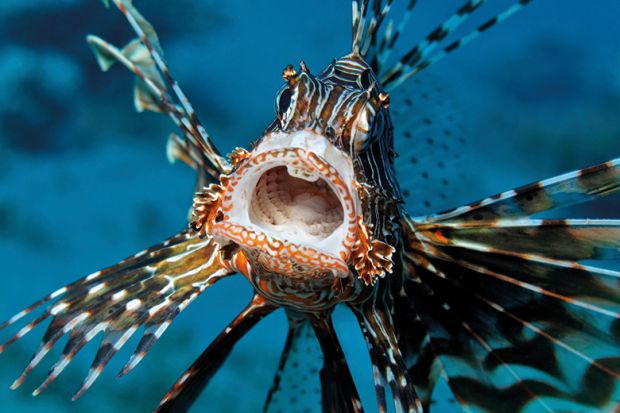It is the hedgehog of the reef: a tropical fish whose quill-like fin spines inflict a painful sting. Now the zebra lionfish has become embroiled in an expanding research misconduct investigation that stretches from a Queensland island to the chilly Baltic and the grasslands of Saskatchewan.
The journal Biology Letters has issued an expression of concern about a 2014 research paper that claimed that the colourful creatures hunted cooperatively with each other and with other lionfish species – behaviour previously documented among marine mammals such as killer whales and bottlenose dolphins but never demonstrated in fish.
“It has been brought to the attention of the editorial team that there are concerns regarding the validity of data used in the study,” the journal notice says.
The article’s first author, a doctoral student at Australia’s James Cook University when she conducted the study, played a central role in arguably the biggest research misconduct scandal of 2017.
Oona Lönnstedt was last year found guilty of deliberately fabricating the data underpinning a 2016 paper in the journal Science. That article had concluded that European perch larvae were becoming stunted, and easy pickings for predatory pike, because they preferred minute fragments of plastic to the tiny shrimp that composed their natural diet.
The findings coincided with increasing concern about microplastics in the ocean and declining perch numbers in the Baltic. They attracted global headlines and helped to earn Dr Lönnstedt a $330,000 (£236,000) research grant from a Swedish funding agency.
But the paper’s conclusions attracted disbelief from two marine biologists who had been at the research station on the Baltic island of Gotland, where Dr Lönnstedt claimed to have conducted the study, and had seen no signs of the experiments being conducted.
They asked why the original data had not been included in the paper or archived in a public repository, as required under Science policies. Dr Lönnstedt and senior researcher Peter Eklöv, both of Uppsala University, claimed to have lost their only copy of the data when a laptop computer was stolen from a car.
Investigations by seven whistleblowers in five countries, most of whom had come into contact with Dr Lönnstedt during fieldwork on the Great Barrier Reef, raised more questions.
The group compiled evidence that Dr Lönnstedt had been on Gotland for only 11 days – even though the experiments supposedly ran for three weeks – and had not had enough equipment or fish to conduct the experiments described in the paper.
A 2016 investigation by Uppsala University cleared its researchers and accused the whistleblowers of maligning them. But inquiries by Sweden’s Central Ethical Review Board led to the paper’s retraction last May, while a follow-up investigation by Uppsala found the pair guilty of research misconduct.
The findings triggered questions over where and how such a young researcher had learned to fabricate data. Dr Lönnstedt completed her undergraduate, postgraduate and doctoral degrees at James Cook University.
In December, JCU said that there had been no allegations of research misconduct involving Dr Lonnstedt’s work there. Nevertheless, the university said that it would “review the PhD examiners’ report and determine whether any further investigation is required”.
The concerns raised about Dr Lönnstedt’s 2014 paper echo the doubts cast over her Gotland study. Biology Letters said that it was investigating a discrepancy in the number of lionfish obtained by Dr Lönnstedt at her research facility, at Lizard Island off the north Queensland coast, and the dozens of specimens supposedly used in her experiments.
An Australian marine biologist, who asked not to be named, said that the lionfish were very rare in the water of the northern Great Barrier Reef and dismissed the idea that a researcher could catch dozens of them around Lizard Island for the study as “completely unrealistic”.
Dr Lönnstedt did not respond to requests for comment. Times Higher Education asked JCU for an update on its investigation into her thesis, including whether it had examined research related to the Biology Letters paper.
A spokesman said that the university was “in the process of convening an external panel to investigate her research”. “JCU is committed to the highest standards of ethical research,” he added.
Dr Lönnstedt’s co-authors on the 2014 paper, University of Saskatchewan biologists Doug Chivers and Maud Ferrari, declined to comment until the Biology Letters investigation had run its course.
A Saskatchewan spokeswoman indicated that the pair had been unable to contact Dr Lönnstedt, who had been responsible for conducting the experiments. “Our administrators are now contacting JCU to ask whether that university can provide a copy of the data,” she added.
According to records at the Lizard Island Research Station, Dr Lönnstedt’s work there has contributed to 18 papers in which she was lead author or co-author, on subjects including fish’s predatory behaviour, ocean acidification and habitat degradation. Half of the articles were also co-authored by Professor Chivers, Dr Ferrari or both.




